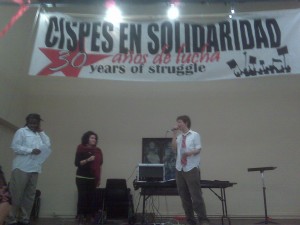LISTEN TO ALEXIS STOUMBELIS & BURKE STANSBURY
Audio clip: Adobe Flash Player (version 9 or above) is required to play this audio clip. Download the latest version here. You also need to have JavaScript enabled in your browser.
LISTEN TO ROSA LOZANO & SONIA UMANZOR
Audio clip: Adobe Flash Player (version 9 or above) is required to play this audio clip. Download the latest version here. You also need to have JavaScript enabled in your browser.
This winter, activists and supporters have gathered in four cities across the U.S. (Seattle, LA, NY and DC) to celebrate the 30th anniversary of CISPES (Committee in Solidarity with the People of El Salvador). The organization shares the same birthday as the FMLN (Farabundo Marti National Liberation Front), which formed in response to growing U.S. backed violence in El Salvador. CISPES was created in order to build “a national movement to end U.S. support for the military regime in El Salvador and to stand in solidarity with the struggle for self determination in the Americas.” Today, it is not a U.S. backed military regime in power in El Salvador, but the FMLN.
December 11, at the 30th anniversary celebration at St. Stephen’s Church in northwest DC, CISPES executive director Alexis Stoumbelis discussed the conditions which gave rise to both CISPES and FMLN: “In 1980, there was just alarming violence and rising repression from the Salvadoran state, especially the Salvadoran military and paramilitary forces, against social movements, unions, especially the student movement, organized campesinos and farmers. All of the social movements in El Salvador that had really been taking to the streets and posing a really powerful challenge to the regime in the late 70s were being disappeared, murdered… by the thousands.”
Stoumbelis continued, “Around that same time the solidarity movement was being organized in the United States, led in many ways, in the beginning, by Salvadoran refugees, many of whom were those same organizers, union organizers, student organizers, who had fled, made it to the United States, especially in cities like Los Angeles, San Francisco and D.C. [They] were educating, organizing to stop the repression because it was being funded and supported by the millions upon millions of dollars by the United States under the Reagan administration.”
Sonia Umanzor, one of the many who fled the U.S. backed violence, said, “First of all, to be alive 30 years after the big massacres and the war that started in El Salvador in 1980 is really great. We celebrate CISPES’ 30th anniversary with joy… I came [to the U.S.] in 1981 and… [CISPES] saved my life and saved my heart because it showed me that the… people of the U.S. are different from the [U.S.] government, who was intervening in El Salvador.”
Umanzor listened closely as her daughther, born and raised in the U.S., spoke. “[CISPES] didn’t save my life in a literal sense,” said Rosa Lozano, “but it did save me [from] a life of consumerism and abiding to the status quo and gave me an alternative and made me realize that there are movements out there that are fighting for something different. That a different world is possible.”
With the military regime overthrown and FMLN in power, is CISPES’ work still necessary? Burke Stansbury, the immediate past executive director of CISPES, said, “[A]s long as the U.S. government is out there pushing an economic model that is not beneficial to the majority of people in El Salvador, in Guatemala, in Nicaragua and the rest of Latin America and the rest of the world, there is a role for a solidarity movement. And in particular in El Salvador because I think it’s been sort of a place where the U.S. government has tested out a lot of its policies.”
Stansbury continued, “From military policies during the civil war to economic policies post-civil war, El Salvador has remained very strategic for the United States government in Latin America and in the rest of the world. It’s a tiny country, but it’s still very strategic geopolitically. And that’s why it’s still very strategic to be in solidarity with the revolutionary movement in El Salvador and that’s what CISPES is continuing to do.”



